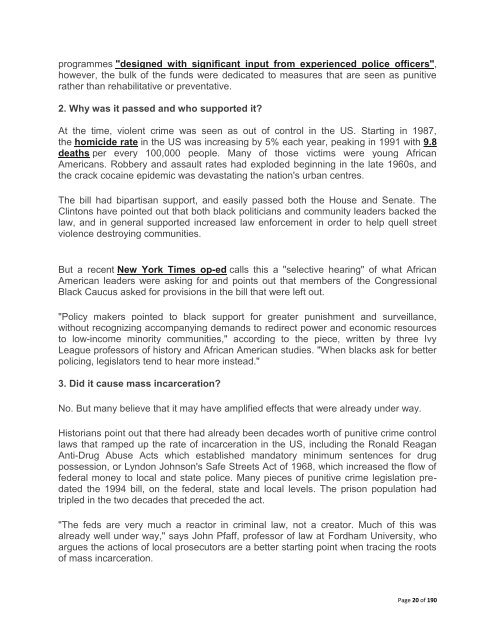The Violent Crime and Law Enforcement Act of 1994
The Violent Crime and Law Enforcement Act of 1994
The Violent Crime and Law Enforcement Act of 1994
You also want an ePaper? Increase the reach of your titles
YUMPU automatically turns print PDFs into web optimized ePapers that Google loves.
programmes "designed with significant input from experienced police <strong>of</strong>ficers",<br />
however, the bulk <strong>of</strong> the funds were dedicated to measures that are seen as punitive<br />
rather than rehabilitative or preventative.<br />
2. Why was it passed <strong>and</strong> who supported it?<br />
At the time, violent crime was seen as out <strong>of</strong> control in the US. Starting in 1987,<br />
the homicide rate in the US was increasing by 5% each year, peaking in 1991 with 9.8<br />
deaths per every 100,000 people. Many <strong>of</strong> those victims were young African<br />
Americans. Robbery <strong>and</strong> assault rates had exploded beginning in the late 1960s, <strong>and</strong><br />
the crack cocaine epidemic was devastating the nation's urban centres.<br />
<strong>The</strong> bill had bipartisan support, <strong>and</strong> easily passed both the House <strong>and</strong> Senate. <strong>The</strong><br />
Clintons have pointed out that both black politicians <strong>and</strong> community leaders backed the<br />
law, <strong>and</strong> in general supported increased law enforcement in order to help quell street<br />
violence destroying communities.<br />
But a recent New York Times op-ed calls this a "selective hearing" <strong>of</strong> what African<br />
American leaders were asking for <strong>and</strong> points out that members <strong>of</strong> the Congressional<br />
Black Caucus asked for provisions in the bill that were left out.<br />
"Policy makers pointed to black support for greater punishment <strong>and</strong> surveillance,<br />
without recognizing accompanying dem<strong>and</strong>s to redirect power <strong>and</strong> economic resources<br />
to low-income minority communities," according to the piece, written by three Ivy<br />
League pr<strong>of</strong>essors <strong>of</strong> history <strong>and</strong> African American studies. "When blacks ask for better<br />
policing, legislators tend to hear more instead."<br />
3. Did it cause mass incarceration?<br />
No. But many believe that it may have amplified effects that were already under way.<br />
Historians point out that there had already been decades worth <strong>of</strong> punitive crime control<br />
laws that ramped up the rate <strong>of</strong> incarceration in the US, including the Ronald Reagan<br />
Anti-Drug Abuse <strong>Act</strong>s which established m<strong>and</strong>atory minimum sentences for drug<br />
possession, or Lyndon Johnson's Safe Streets <strong>Act</strong> <strong>of</strong> 1968, which increased the flow <strong>of</strong><br />
federal money to local <strong>and</strong> state police. Many pieces <strong>of</strong> punitive crime legislation predated<br />
the <strong>1994</strong> bill, on the federal, state <strong>and</strong> local levels. <strong>The</strong> prison population had<br />
tripled in the two decades that preceded the act.<br />
"<strong>The</strong> feds are very much a reactor in criminal law, not a creator. Much <strong>of</strong> this was<br />
already well under way," says John Pfaff, pr<strong>of</strong>essor <strong>of</strong> law at Fordham University, who<br />
argues the actions <strong>of</strong> local prosecutors are a better starting point when tracing the roots<br />
<strong>of</strong> mass incarceration.<br />
Page 20 <strong>of</strong> 190
















